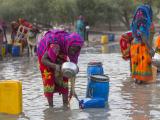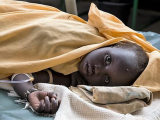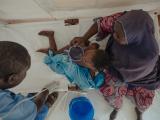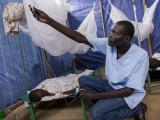The idea of using cholera vaccines as a response tool got a boost today, with researchers reporting promising results during a 2012 outbreak in Guinea for Shanchol, one of two cholera vaccines that have been developed.
In other cholera news, cases in Haiti in the first 3 months of this year were 75% lower than in the same period last year and the fewest since the epidemic began in 2010, according to a statement yesterday from the United Nations (UN).
Overcoming vaccine perceptions
Global health officials have been hesitant to embrace the new cholera vaccines in outbreak settings, because they are traditionally thought of as being expensive, requiring multiple doses, and providing limited protection. However, recent vaccine trials have suggested the campaigns are worth considering.
In new findings today, researchers from Doctors Without Borders (Medecins Sans Frontieres, or MSF) set out to test the short-term effectiveness of two doses of Shanchol, made by Shantha Biotechnics—an India-based subsidiary of Sanofi—for the first time in an outbreak. They published their findings in the New England Journal of Medicine (NEJM).
Researchers have assessed the vaccine's protection over the long term, but they haven't measured its effect in the first months of vaccination. Though the other cholera vaccine, Dukoral, has shown good short-term protection and has already been used in the field in Asia and Africa, outbreak response officials are keenly interested in Shanchol's performance, because it is much cheaper, doesn't require buffer, and has a lower storage volume—all factors that would make it easier to deploy.
The matched case-control study took place in Guinea, where mass vaccination campaigns, along with other response measures, targeted people in Boffa and Forecariah prefectures. Residents received two doses of Shanchol, 2 weeks apart, based on World Health Organization (WHO) recommendations.
The team enrolled 40 case-patients who had lab-confirmed cholera infections, and compared vaccination rates with 160 age- and sex matched controls to determine vaccine effectiveness. They conducted face-to-face interviews to see if people had received the vaccine, and study participants were asked, if possible, to show their vaccine cards.
Effectiveness estimated at 87%
After adjusting for possible health-seeking behavior and information biases, they found that two doses provided significant protection against cholera, with a vaccine effectiveness of 86.6% (95% confidence interval, 56.7% to 95.8%). Researchers noted that the short-term protection level is on par with Dukoral and is reassuring, because other oral vaccines that have been tested in Africa have shown low levels of protection.
Another reassuring finding was that Guinea's cold-chain strategy didn't seem to impair short-term protection. Health officials there store the vaccine in cold chain, but transport and use it at ambient temperature the day of vaccination.
Only 25% of participants were able to show their vaccine cards, but the investigators said if they considered only participants who had their cards, vaccine effectiveness would still be 82%.
During the outbreak, 316,250 doses of vaccine were given, with 48 patients reporting adverse reactions that were not severe. Vaccine coverage ranged from 69% to 84% in the areas where the vaccine campaign took place.
The study results bolster the rationale for adding vaccines to cholera outbreak response and supporting global health efforts to build a vaccine stockpile for emergency use, the group concluded. They said more study is needed to determine protection afforded by a single vaccine dose.
Part of comprehensive approach?
In an editorial in the same issue of NEJM, two experts on Haiti's cholera outbreak response wrote that a pilot program using oral cholera vaccines there alongside traditional response tools found that the vaccine could be effectively used as part of a comprehensive program. The authors are Jean William Pape, MD, and Vanessa Rouzier, MD, who are with GHESKIO (Haitian Study Group on Kaposi Sarcoma and Opportunistic Infections).
Promising experiences with the vaccines helped sway the WHO's policy that now supports vaccine use, though questions about Shanchol's short-term effectiveness have been a challenge to fuller implementation, the commentators said
Pape and Rouzier wrote that today's study clearly shows the role that vaccines can play in curbing cholera epidemics.
As vaccine stockpiles grow, some questions remain, such as prioritization when multiple outbreaks are under way and cost-effectiveness, they wrote. The two experts also said a study is under way to test the effectiveness of one dose, which, if effective, would reduce cost and logistics barriers.
They also noted that it's not yet clear if Shanchol—the cheapest and most easily administered vaccine—can be used in pregnant women and children younger than 1 year old.
Declining cases in Haiti
In other cholera news, the UN commented on Haiti's epidemic after a meeting of the High-Level Committee for the Elimination of Cholera in Haiti in Port-au-Prince this week.
Along with the 75% reduction in cholera cases in the first trimester, the fatality rate was below the 1% target set by the WHO, the UN said. The agency didn't specify the number of cases over the 3 months.
Despite the improvement, Haitian Prime Minister Laurent Lamothe said cholera remains an emergency that demands the development of all possible control strategies, according the statement.
The Haitian government's 10-year plan to eliminate cholera requires $2.2 billion for large-scale development of public health and sanitation infrastructure. To support the most urgent activities, the UN said it is appealing for $70 million for the next 2 years, of which $34 million has been raised so far.
Cases in South Sudan approach 600
In other developments, a cholera outbreak that was recognized earlier this month in South Sudan had grown to 586 cases and 22 deaths as of May 25, the WHO Regional Office for Africa announced in a statement.
The index case-patient in the outbreak got sick on Apr 23, and four cases have been confirmed in tests at the African Medical Research Foundation laboratory in Nairobi, Kenya. The nation's health ministry declared the outbreak on May 15.
Cases have been reported in 8 of 15 sub-counties in Juba County, the WHO said.
"Given the on-going conflict and crisis situation in the country, the poor prevailing sanitary conditions, the beginning of the rainy season, and the history of cholera outbreaks in the country, the Ministry of Health of South Sudan continues to monitor the situation in Juba and surrounding areas," the agency said.
Luquero FJ, Grout L, Ciglenecki I, et al. Use of Vibrio cholerae vaccine in an outbreak in Guinea. N Engl J Med 2014 May 29;370(22):2111-20 [Abstract]
Pape JM, Rouzier V. Embracing oral cholera vaccine—the shifting response to cholera. (Editorial) N Engl J Med 2014 May 29;370(22):2067-9 [Full text]
See also:






















